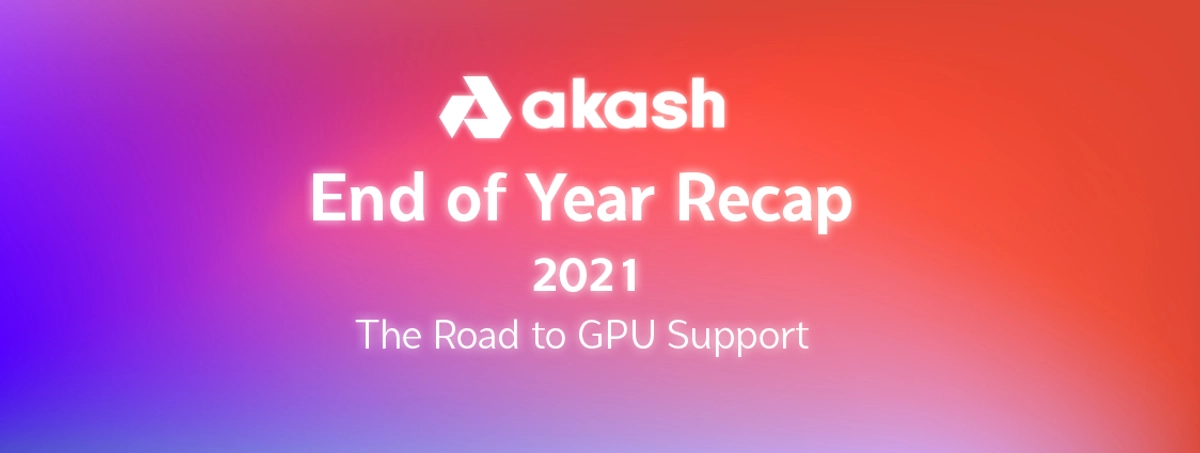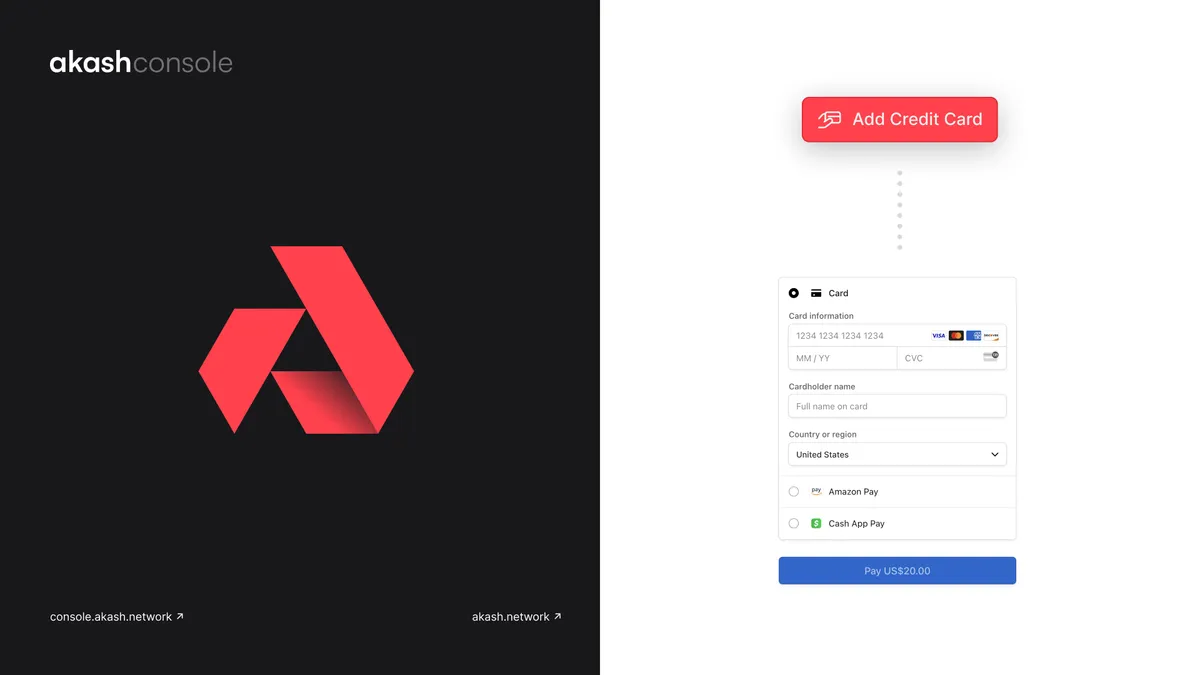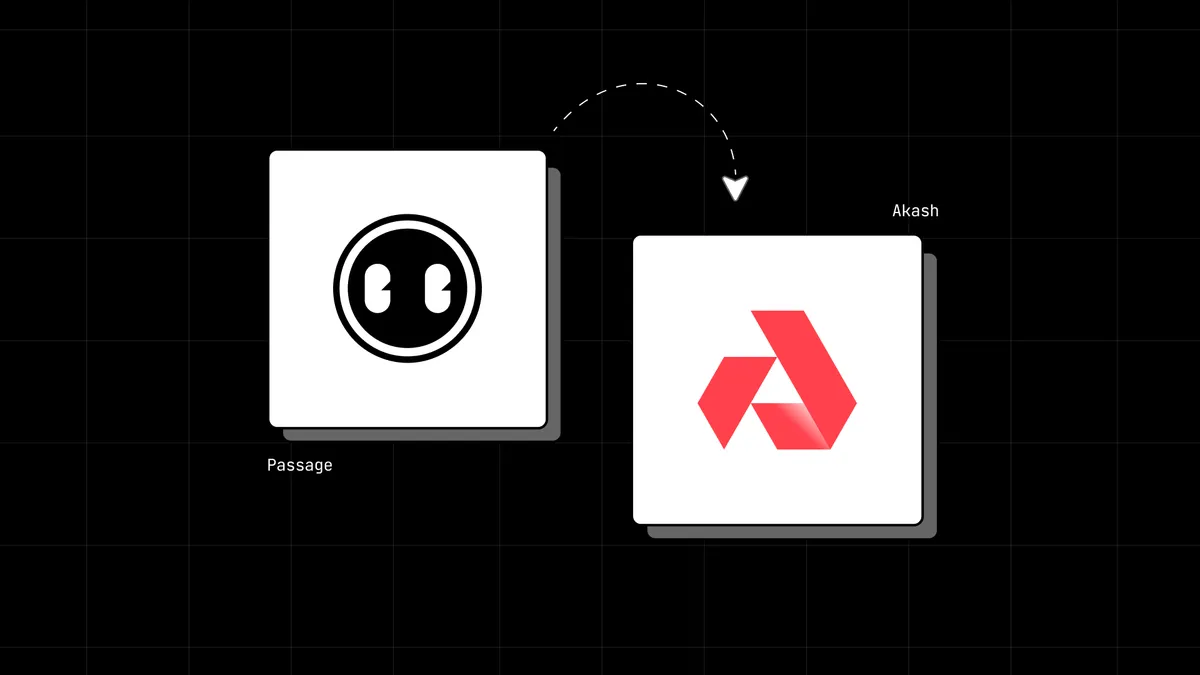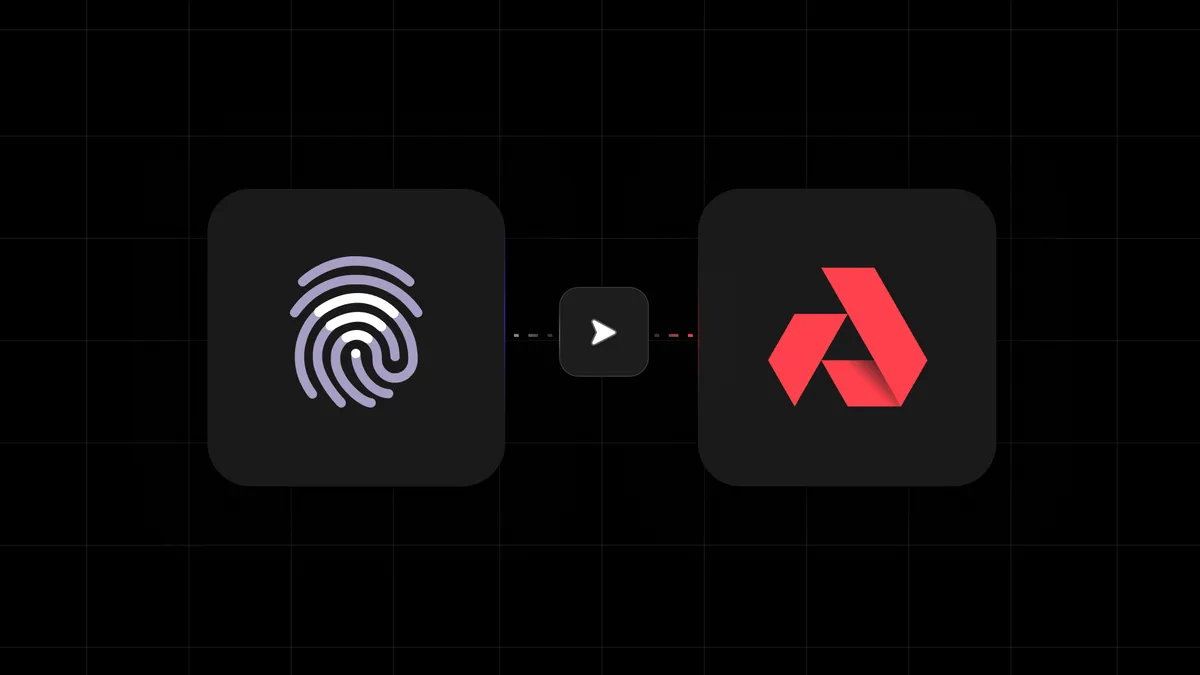
As the year comes to a close, personally and professionally, we tend to get introspective; analyzing our year, celebrating our milestones, and looking ahead to new goals for the New Year.
This year, not only did we launch Akash Network, a distributed peer-to-peer marketplace for cloud compute and the first alternative to Big Tech computing solutions, but we stabilized and optimized the network, ensuring it was ready to scale and finding product-market fit along the way.
In Messari’s Crypto Theses for 2022, they note that “within the Cosmos ecosystem, application-specific blockchains like Akash continue to expand and produce early signs of sustainable network revenue as they match developers who deploy their Docker containers at a significantly reduced cost to cloud providers like AWS or Google, and data centers who can rent excess capacity similar to an Airbnb for data.” While this is exciting for Akash and its users, it’s encouraging for the trailblazers of Web 3.0 as a whole, which is much closer to fruition than many of us thought possible.
We saw a 400x increase in deployments throughout the year and hit the 100 mark in just 112 days after the launch of Akash Network. From there, we saw daily active deployments more than triple.
- Q2: 100 average daily active deployments
- Q3: 312 average daily active deployments
- Q4: 448 average daily active deployments

With a total of 60,000 deployments, 9 partnerships, 7 new listings, and a handful of new product features (like storage) in our first year, 2021 was a big one for Akash Network and there’s a lot to look back on, but even more to look forward to.
The TL;DR
- March 2021 Akash Network launched its open-source, decentralized cloud, the first alternative to Big Tech centralized cloud service providers.
- We saw a 400x increase in deployments throughout the year and hit the 100 mark in just 112 days after launch.
- Since releasing our 2022 Product Roadmap in September, the Core Dev team has made remarkable progress and cleared the pathway for a GPU Marketplace on Akash in early 2022.
- Akash Token (AKT) is now on a total of 8 exchanges. This year we announced listings on BHEX, Bittrex Global, Gate.io as well as decentralized exchanges such as Osmosis and Emeris.
- This year, we established 9 key partnerships with foundational partners and mining communities such as Equinix Metal, Helium, Kava, Polygon, pkt.cash, and Skynet Labs.
- We had a 271% increase in our community this year and now have 85,266 total community members around the world.
- We’re in the home stretch of unlocking GPU support and just have one more step along the way in the form of a Testnet, coming Q1 2022.
Product
Five years in the works, 2021 was the year Akash Network launched its open-source, decentralized cloud, the first alternative to Big Tech centralized cloud service providers like Amazon Web Services (AWS), Google Cloud, and Microsoft Azure. With the launch of Akash Network, developers are able to launch applications such as DeFi apps, blogs, games, data visualizations, block explorers, blockchain nodes, and other blockchain network components on a decentralized cloud.
As a developer-centric platform, this past year was focused on user feedback, enhancing functionality, and overall simplifying the user experience. Through the development of the IBC Relayer, a vehicle for blockchains to communicate, easy-to-use deploy tools, and Akash Omnibus that allows developers to spin up other Cosmos blockchain nodes with just a few clicks (pssst, run don’t walk, we’ve just doubled the number of blockchains that it supports), we’ve not only seen the number of active deployments more than triple, but we’ve seen a significant increase in AKT spend.
Since releasing our 2022 Product Roadmap in September, our Core Dev team has made a lot of progress on the ASN Market which allows dedicated IP addresses (and ports) for workloads and marketplace to source them. This unlocks new use cases where workloads require standard ports and a dedicated IP address.
In addition to the ASN Market, we’ve added some features on our blockchain like storage and tooling, ultimately clearing the pathway for a GPU Marketplace on Akash in early 2022.
Listings
AKT is now on a total of 8 exchanges. This year we announced listings on BHEX and Bittrex Global and are seeing an influx of decentralized exchanges (DEX) appear on the market that allows for fewer regulatory restrictions, lower transactions fees, and higher incentives.
Decentralized Exchanges
Our first DEX listing was Osmosis, an automated market maker (AMM) protocol built for liquidity providers, allowing users to earn rewards for providing liquidity. Users are now able to pair the Cosmos native coin, atom (ATOM), one of the most widely available tokens in the world, to AKT, significantly increasing access to our utility token. This enables ATOM holders with the ability to swap their ATOM for AKT, increasing the incentives to buy and hold AKT by incentivizing liquidity pools with OSMO tokens for offering their AKT to the pool.
Hosted on Akash, Osmosis was a huge success with over $100-million in Total Locked Value in its first month.
“We’re excited to have Akash Network be one of the first launch partners of Osmosis. Akash Network enables a new generation of resilient, decentralized Internet infrastructure to be built, and Osmosis provides a gateway for anyone to take part in this decentralized economy. For Osmosis to be a truly decentralized exchange, we need to be built on a decentralized infrastructure. Osmosis will be a proud user of Akash infrastructure to host our applications and API-serving nodes.”
Sunny Aggarwal, Co-founder of Osmosis
AKT is now supported on a second decentralized exchange, Emeris, a portal to cross-chain DeFi. As one of the first tokens available on Emeris, users can now swap, transfer, pool and manage AKT across multiple chains. Emeris saw four million in Total Locked Value in less than a week.
Partnerships & Hackathons
This year, we established key partnerships which laid the foundation for Akash Network and presented the building blocks that are necessary for tomorrow. These partnerships include:
- Equinix Metal X Akash: We kicked off the year by integrating with Equinix Metal to enable developers and companies to decentralize their cloud infrastructure. Equinix is the world’s largest data center and colocation infrastructure provider, with 220 data centers in 25 countries. This was the first domino that allowed us to offer a faster, more efficient, and lower-cost decentralized cloud alternative.
- HashQuark X Akash: Hashquark is a leading staking+ service provider that runs nodes for over 40 blockchain projects including Polkadot, Klaytn, and Cosmos. Back in April, they announced they’ve joined Akash Network’s validator set. Leo Li, CEO of HashQuark said, “our partnership with Akash Network represents our belief and trust in their professional team and forward-looking plans. We are thrilled to work with Akash Network and become part of this awesome project, helping its network vastly expand while ensuring security, paving the way for a more enabling public blockchain ecology.”
- Certik Chain X Akash: A Blockchain and smart contract cybersecurity company followed, allowing their clients to decentralize their cloud infrastructure through using Akash while ensuring on-chain protection backed by CertiK’s trusted products and services.
- Helium Network X Akash: This year, we were selected by the largest peer-to-peer wireless internet-of-things (IoT) network, to provide a decentralized, open-source, and low-cost cloud alternative for Helium’s new blockchain validators. If you’re interested in running a Helium Validator on Akash click, here to learn how in one day or less.
- PKT.cash X Akash: Crypto-mining projects like PKT, are looking for better cloud providers and now they can run on Akash Network. Akash Network helps miners find and lease cloud-hosted CPU and bandwidth from data centers at a lower cost than traditional cloud providers. PKT miners operating on Akash spend 50% less compared to centralized cloud providers. Akash customers also reduce the risk of having operations shut down by providers. While providers ultimately decide if they want to stop bidding on a deployment, the providers on Akash Network are crypto-friendly and benefit by monetizing their underutilized hardware infrastructure on Akash’s marketplace. Click here to see how to deploy a PKT announcement miner on Akash Network.
- Skynet X Akash: We integrated with Skynet Labs to bring together the compute and storage layers in order to provide the first full-stack decentralized web solution to handle backup, restore, and migration. Developers can now host their applications on a fully decentralized cloud. A huge step forward for the evolution of Web 3.0.
- Filebase X Akash: Working with Filebase, we enabled multi-cloud decentralized storage options. By offering open-source dWeb compute and petabyte-scale object storage, developers and enterprises will now have the ability to pair dWeb applications with thousands of existing backup tools, application SDKs, and frameworks that they already know and love.
- Kava X Akash: Akash began integration with Kava in September 2020, and continues to work closely with the Kava Labs team to support cross-chain DeFi applications and services. This year, we were selected by Kava Labs as the preferred distributed peer-to-peer cloud solution for their entire ecosystem. Scott Stuart, CEO of Kava Labs said, “the Kava Ecosystem is all about creating the most secure and scalable decentralized platform for DeFi. “As our preferred cloud provider, Akash Network will empower developers to bring that decentralization all the way through to the frontend of their applications.”
- Polygon X Akash: We joined forces with Polygon on a bounty matching program that offers the Polygon ecosystem a path from traditional cloud to cloud providers on Akash Network, making dApps more decentralized.
Headed into the New Year, our partnership pipeline for 2022 is stacked with additional support options that will unlock new opportunities for new and advanced users to take advantage of the dWeb.
Hackathons
As a part of these partnerships, we organized and participated in a series of hackathons such as the Solana Season Hackathon, HackAtom, Sovrython powered by Gitcoin, and the Permaweb Challenge in partnership with Arweave, to name a few. We were blown away by the quality of the submissions and are proud to say that we had a handful graduate from “projects” to viable tools for the community to use.
The top hackathon project submissions of 2021 go to:
- AI/ML DeCloud Platform by SpacePotato: Tool for building and interacting with AI/ML models and resources.
“Machine learning and AI require lots of storage (for storing data, model checkpoints, production models, etc.) and lots of compute (for experimenting with and training different models, serving the models in production, etc.). Filebase and Akash respectively provide both at a fraction of the cost of their centralized counterparts, but there is no AI/ML platform to take advantage of them right now. Let’s change that.”
SpacePotato
- Open Registry by Jasdeep Singh: A decentralized container registry, which would be fully OCI Distribution Specification compliant. This means that OpenRegistry would be completely compatible with any relatively new version of container engines like Docker, Container, Podman, etc. See the full project, here.
“OpenRegistry uses Akash Network as its compute layer and SkyNet for storage. Since Akash Network provides a marketplace for compute, the fault tolerance, scalability, and resiliency were our priorities from day one.”
Jasdeep Sing, OpenRegistry Founder
-
Akashlytics deploy tool by The Akashalytics Team: This allows you to create or import a wallet, fund the wallet, create a certificate, create a deployment, accept a bid to create a lease and finally, send the manifest. The process of creating and hosting a web app on Akash inspired the Akashlytics team to create a fully dependency-free desktop app that can be installed in a few clicks on Windows, Mac, and Linux and be able to do all the steps required to deploy on Akash in the same app. Click here to check out the platform.
-
Akash Deploy by SpacePotato: A web-based tool for deploying and managing containers on the Akash Network. The deploy website leverages a new AkashJS library that replaces the command line functionality with JavaScript. Click here to see the platform.
-
Minecraft deployment on Akash by SlowRiot: Launch a Minecraft server on the Akash blockchain. It can be easily configured with only changes to deploy.yaml, and supports any Minecraft version, including multiple modded server types. See the full project, here.
-
Akashian Public Library by Rodrigo Rochin: The Akashian Public Library is a platform that allows anyone to find interesting copyright. This includes free books, comics, documents, media and information, and accessing the library is completely free. See the full project, here.
-
Radical.xyz by SlowRiot: Host a gitpage-like website anonymously, using decentralized Akash resources, directly from a Radicle or git repository. See the full project, here.
Community & Events
Community Growth
Our community has grown by leaps and bounds over the past year. At the beginning of 2020, our community totaled 22,843 members. As of the time of this blog post, we have 85,266 total community members around the world. A 273% increase!
Our main community hubs are in the United States, China, Russia, and Korea. However, we’re not stopping there. With the help of our Insider community (we’ll cover that next) we have plans to grow our local hubs in South America, Turkey, India, Portugal, and beyond.
We are so humbled by the growth and efforts of our community and wouldn’t be in the place we are today if it were not for the dedication and passion of our global community.
Akash Insiders
The Akash Insiders are community moderators, event organizers, and content contributors. They are leaders within our community and spearhead the growth of not just Akash, but the entire crypto ecosystem in cities and towns, globally.
Last summer, when we launched the Insiders program, we didn’t know if anyone inside the Akash community would be interested in joining. After all, the program is volunteer-based and many members of our community have jobs and live outside of crypto. We were blown away by the interest and response. Since its launch, we’ve had over 268 applications to participate and we’ve onboarded 28 Akash Insiders. Insiders are the tip of the spear and we have big plans for the program in 2022 and look forward to onboarding many more Insiders over the coming days and months. If you’d like to get involved as an Akash Insider, click here.
Community Events
The pandemic has affected everyone and Akash has not been immune to the effects of this global pandemic. However, with restrictions calming and precautions in place, we’ve been able to increase our reach through local in-person gatherings and online activities.
Over the past year, we’ve held 82 online events. From Youtube Livestreams to Telegram AMA’s to Twitter Spaces events. We’ve been able to connect with our community. In addition to online events, We hosted our first-ever in-person Akash meetups in New York, during Messari Mainnet.

We also hosted a series of events in Lisbon during Solana Breakpoint. We could have never done any of these events without the help of numerous partners such as Ledger, Infura, Polygon, Filebase, Agoric, Osmosis, and of course, Cosmos.

2022
As the world becomes more digitalized, we see GPUs everywhere. Not just in computers but cell phones, gaming consoles, and yes, even Teslas. And, as Ethereum moves towards a PoS model, it’s inevitable that more will hit the market at that time.
Once unlocked, GPU support on Akash will not only open the door for the next generation of Web3 games but will unlock unprecedented Artificial Intelligence (AI) and Machine Learning (ML) capabilities. Meaning, everyone will be able to run even more complex workloads without fear of de-platforming or censorship.
“This has been a monumental year with the launch of Akash Network, a product for developers by developers that Adam Bozanich, my Cofounder, and I created as a result of dealing with the barriers that centralized cloud providers presented. We saw a need and wanted a better alternative for the builders of tomorrow. We’re that much closer towards a flourishing Web 3.0 and with GPU support on the docket, we’re excited to crack open a whole new array of use cases.”
Greg Osuri, CEO of Akash Network
We’re in the home stretch and just have one more step along the way in the form of a Testnet. Coming early 2022, we’ll share more details on what the challenges look like and how you can participate in unlocking the future of Web 3.0.


